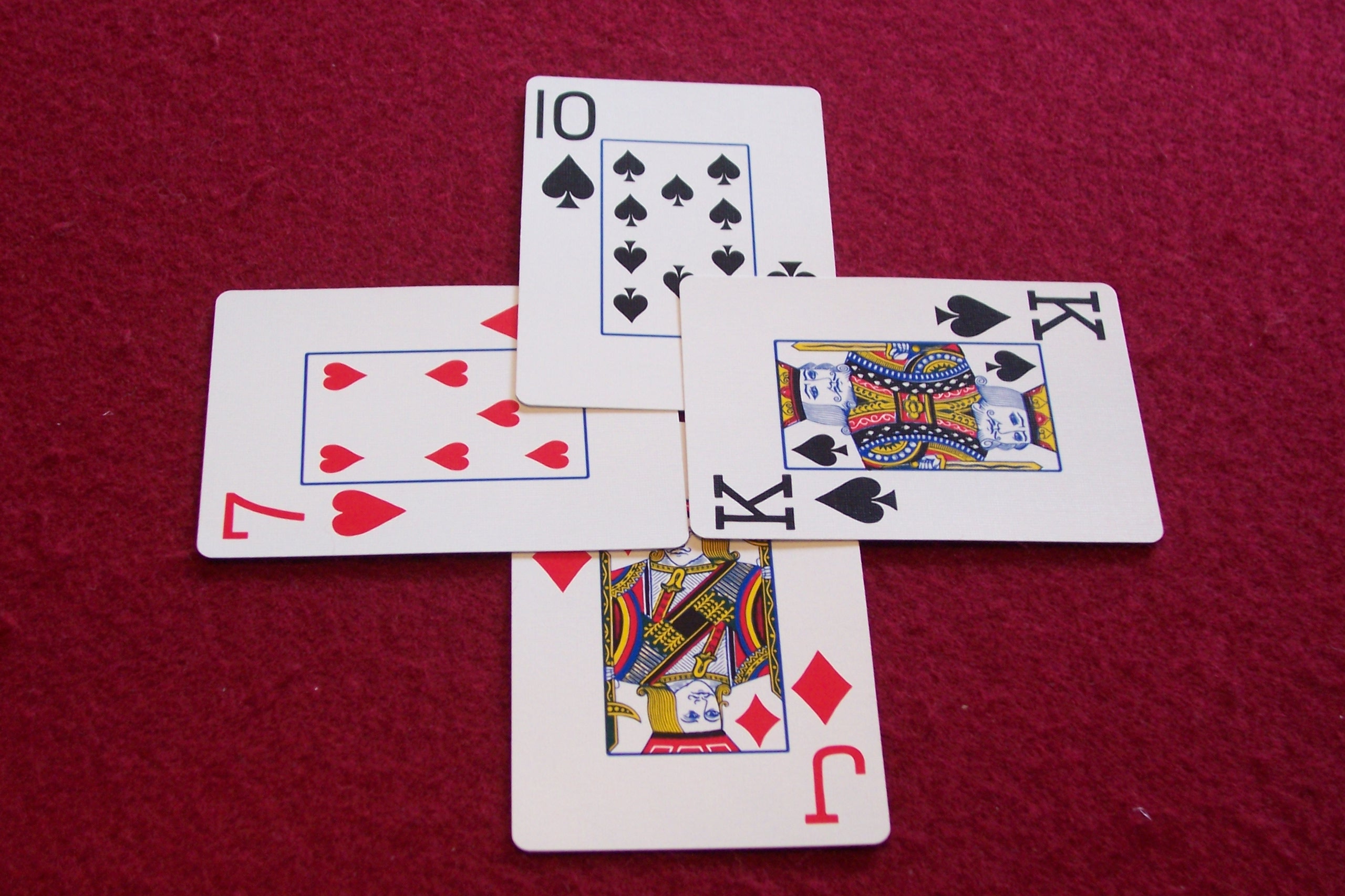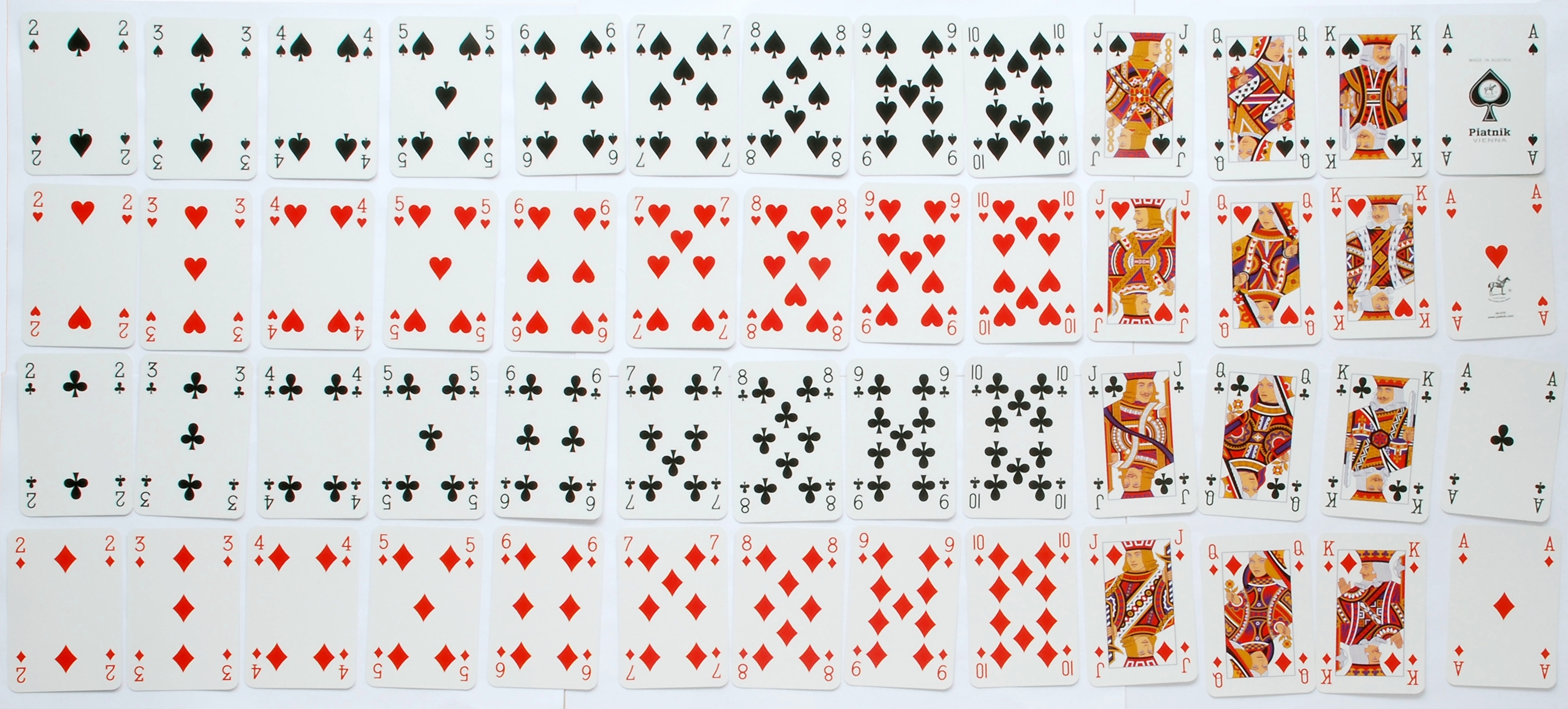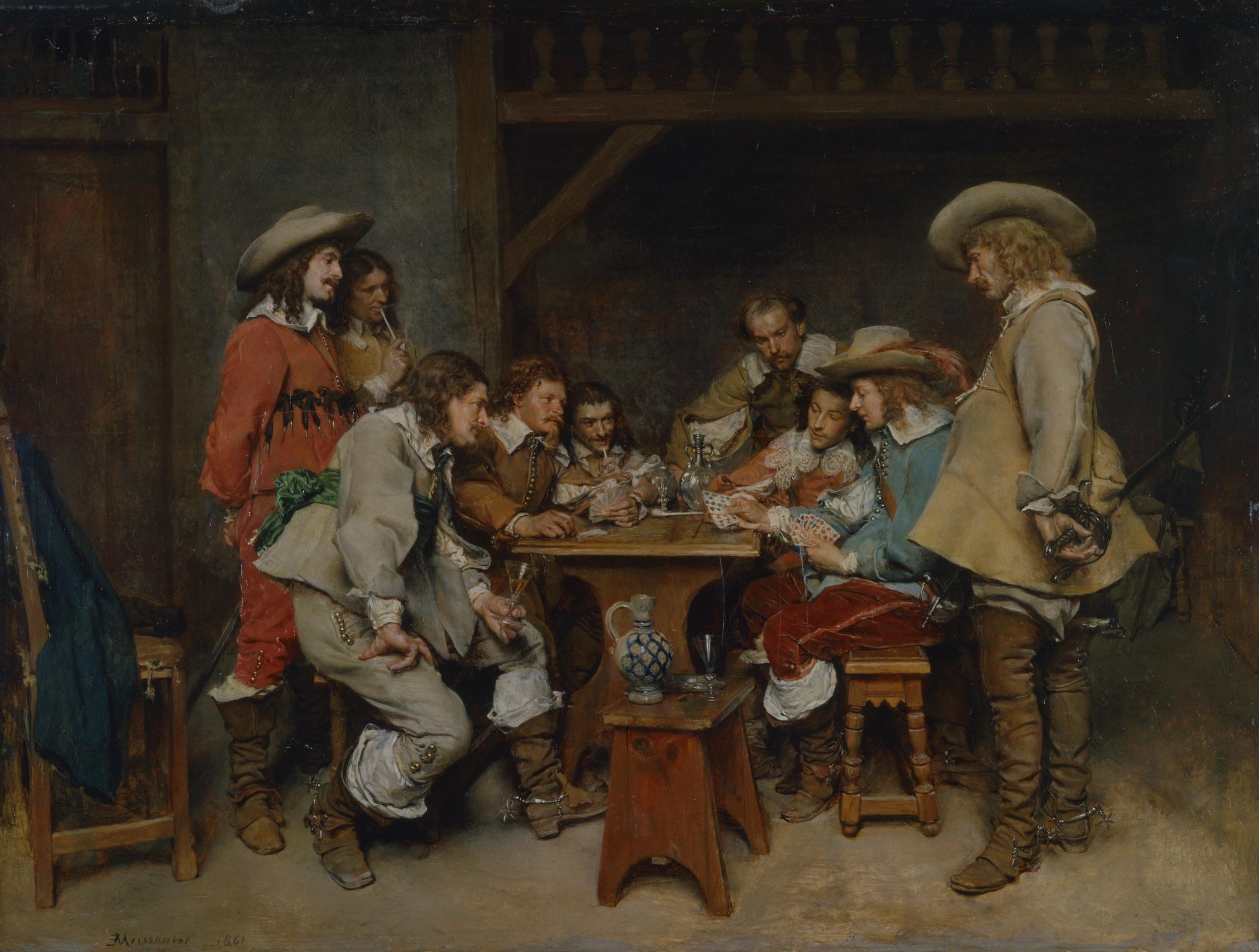|
Pandoer
Pandoer is a Dutch card game which shows certain resemblance to solo whist and klaverjas. It is normally played by four players using cents and a 33-card deck composed from French playing cards. Rules The rules differ in many ways, but the following are roughly the general rules: Material The game is played with 33 cards: all cards from 7 and up from a French-suited deck (a piquet deck) and the six of hearts. In addition, each player starts with a certain number of 'cents' on a stack in front of them. At the start of the game, each player puts ten of their cents into the 'pot', a community stack next to the middle of the table. This is called "lappen". Whenever the pot exhausts, this process is repeated. Deal One of the players is the dealer for the first round. Every subsequent round, this role will pass to the left. The dealer shuffles the cards and hands four personal cards to each player, which the opponents are not supposed to see, then one open card in the middle of the ... [...More Info...] [...Related Items...] OR: [Wikipedia] [Google] [Baidu] |
Card Game
A card game is any game that uses playing cards as the primary device with which the game is played, whether the cards are of a traditional design or specifically created for the game (proprietary). Countless card games exist, including families of related games (such as poker). A small number of card games played with traditional decks have formally standardized rules with international tournaments being held, but most are folk games whose rules may vary by region, culture, location or from circle (cards), circle to circle. Traditional card games are played with a ''deck'' or ''pack'' of playing cards which are identical in size and shape. Each card has two sides, the ''face'' and the ''back''. Normally the backs of the cards are indistinguishable. The faces of the cards may all be unique, or there can be duplicates. The composition of a deck is known to each player. In some cases several decks are Shuffling, shuffled together to form a single ''pack'' or ''shoe''. Modern car ... [...More Info...] [...Related Items...] OR: [Wikipedia] [Google] [Baidu] |
Solo Whist
Solo whist is the English form of Wiezen (Belgian or Ghent Whist), a simple game of the Boston family played in the Low Countries. It is a trick-taking card game for four players in which players can bid to make eight tricks in trumps with any partner, or a solo contract playing against the other three players. Thus it combines both partnership and cut-throat play. Scoring is with small stakes won or paid out on each hand. History Wiezen or Belgian Whist, a simple form of Boston, has been played in the Low Countries since the early 19th Century. The game was introduced to London in 1852 by a family of Dutch Jews. It quickly became popular in London's Jewish Community and was known as Solo Whist. In the early 1870s Solo Whist was played as a low stakes gambling game in London's sporting clubs as a replacement for more complex and slower games like Whist. Solo Whist continued to be played as a social gambling game in homes and pubs during the 20th Century in Britain, Australia and ... [...More Info...] [...Related Items...] OR: [Wikipedia] [Google] [Baidu] |
Klaverjas
Klaverjas () or Klaverjassen () is a Dutch four-player trick-taking card game that uses a Piquet pack of 32 playing cards. It is closely related to the game of Klaberjass (also known as Bela) and is one of the most popular card games in the Netherlands, traditionally played in cafes and social clubs. It offers a considerable level of complexity and depth. It has numerous variants, but its basic rules are universal. History The name dates to 1890–95 from the Dutch word ''klaverjas'', combining ''klaver'' (the suit of clubs, literally "clover") plus ''jas'', the original name for the highest trump card.Random House Unabridged Dictionary 200 at Dictionary.com According to Scarne,John Scarne ''Scarne on Card Games: How to Play and Win at Poker, Pinochle, Blackjack, Gin and Other Popular Card Games'' pg. 414 Dover Publications (2004) its origin has been variously claimed by the Dutch, Swiss, French, and Hungarians. Parlett unequivocally states that its family of games originated ... [...More Info...] [...Related Items...] OR: [Wikipedia] [Google] [Baidu] |
French Playing Cards
French-suited playing cards or French-suited cards are playing cards, cards that use the French Playing card suit, suits of (clovers or clubs ), (tiles or diamonds ), (hearts ), and (pikes or spades ). Each suit contains three or four face cards, face/court cards. In a standard 52-card deck these are the (jack (playing card), knave or jack), the (queen (playing card), lady or queen), and the (king (playing card), king). In addition, in Tarot packs, there is a (Knight (playing card), knight) ranking between the queen and the jack. Aside from these aspects, decks can include a wide variety of regional and national patterns, which often have stripped deck, different deck sizes. In comparison to Spanish playing cards, Spanish, Italian playing cards, Italian, German playing cards, German, and Swiss playing cards, French cards are the most widespread due to the geopolitical, commercial, and cultural influence of France, the United Kingdom, and the United States ... [...More Info...] [...Related Items...] OR: [Wikipedia] [Google] [Baidu] |
Piquet
Piquet (; ) is an early 16th-century plain-trick card game for two players that became France's national game. David Parlett calls it a "classic game of relatively great antiquity... still one of the most skill-rewarding card games for two" but one which is now only played by "aficionados and connoisseurs." Historically also known as Sant or Saunt from the French ''Cent''. History Piquet is one of the oldest card games still being played. It is first mentioned, as ''Le Cent'', in a written reference dating to 1535, in ''Gargantua and Pantagruel'' by Rabelais. Although legend attributes the game's creation to Stephen de Vignolles, also known as La Hire, a knight in the service of Charles VII during the Hundred Years' War, it may possibly have come into France from Spain because the words "''pique''" and "''repique''", the main features of the game, are of Spanish origin. The earliest clear mention of the game – leaving aside various predecessors – is in 1585 by Jacques Perr ... [...More Info...] [...Related Items...] OR: [Wikipedia] [Google] [Baidu] |
Shuffling
Shuffling is a technique used to randomize a deck of playing cards, introducing an element of chance into card games. Various shuffling methods exist, each with its own characteristics and potential for manipulation. One of the simplest shuffling techniques is the overhand shuffle, where small packets of cards are transferred from one hand to the other. This method is easy to perform but can be manipulated to control the order of cards. Another common technique is the riffle shuffle, where the deck is split into two halves and interleaved. This method is more complex but minimizes the risk of exposing cards. The Gilbert–Shannon–Reeds model suggests that seven riffle shuffles are sufficient to thoroughly randomize a deck, although some studies indicate that six shuffles may be enough. Other shuffling methods include the Hindu shuffle, commonly used in Asia, and the pile shuffle, where cards are dealt into piles and then stacked. The Mongean shuffle involves a specific seq ... [...More Info...] [...Related Items...] OR: [Wikipedia] [Google] [Baidu] |
Card Player
Card players are those participating in a card game. Various names are given to card players based on their role or position. Position Games of Anglo-American origin In games of Anglo-American origin played in English-speaking countries, age refers to the order of priority in which players make the first lead, bid or bet, based on their position at the table.''The Language of Cards'' at www.parlettgames.uk. Retrieved 4 August 2018 This changes constantly as the dealer rotates either clockwise or anticlockwise around the table. They are traditionally referred to as follows: ; Eldest hand (or elder hand): the player who enjoys greatest priority and e.g. is the first to receive cards in the deal. Elder is the non-dealer in two-hand games. ; Youngest hand (or younger hand): the player who has the lowest p ... [...More Info...] [...Related Items...] OR: [Wikipedia] [Google] [Baidu] |
Trump (card Games)
A trump is a playing card which is elevated above its usual rank in trick-taking games. Typically an entire suit is nominated as a ''trump suit''; these cards then outrank all cards of plain (non-trump) suits. In other contexts, the terms ''trump card'' or ''to trump'' refers to any sort of action, authority or policy which automatically prevails over all others. The introduction of trumps is one of only two major innovations to trick-taking games since they were invented; the other being the idea of bidding. Trump cards, initially called '' trionfi'', first appeared with the advent of Tarot cards in which there is a separate, permanent trump suit comprising a number of picture cards. The first known example of such cards was ordered by the Duke of Milan around 1420 and included 16 trumps with images of Greek and Roman gods. Around the same time that Tarot cards were invented with the purpose of adding a trump suit to the existing four suits, a similar concept arose in the g ... [...More Info...] [...Related Items...] OR: [Wikipedia] [Google] [Baidu] |
Pagat
The trull is a trio of three special trump (cards), trump cards used in Tarock (card games), tarock games in Austria and other countries that have a much higher card value than the other trumps. The individual cards are known as trull cards (''Trullstücke''). The word ''trull'' is derived from the French ''tous les trois'' which means "all three". In spite of its French roots the term is not common in the game of French tarot, where the trull cards are called ''les bouts'' ("butts", "ends") or, in earlier times, ''les oudlers'', which has no other meaning. In German, they were initially called ''matadors'', a word borrowed from the game (with ordinary cards) of Ombre. Introduction The games of the tarot card games, tarot (French) or Tarock (card games), tarock (German) family are distinguished mainly in that, in addition to the suit cards, their decks have a series of 21 classical, permanent trump (cards), trumps, most of which are numbered with Roman numerals, Roman or Arabi ... [...More Info...] [...Related Items...] OR: [Wikipedia] [Google] [Baidu] |
Dutch Card Games
Dutch or Nederlands commonly refers to: * Something of, from, or related to the Netherlands ** Dutch people as an ethnic group () ** Dutch nationality law, history and regulations of Dutch citizenship () ** Dutch language () * In specific terms, it reflects the Kingdom of the Netherlands ** Dutch Caribbean ** Netherlands Antilles Dutch may also refer to: Places * Dutch, West Virginia, a community in the United States * Pennsylvania Dutch Country People Ethnic groups * Pennsylvania Dutch, a group of early German immigrants to Pennsylvania Specific people * Dutch (nickname), a list of people * Johnny Dutch (born 1989), American hurdler and field athlete * Dutch Schultz (1902–1935), American mobster born Arthur Simon Flegenheimer * Dutch Mantel, ring name of American retired professional wrestler Wayne Maurice Keown (born 1949) * Dutch Savage, ring name of professional wrestler and promoter Frank Stewart (1935–2013) Arts, entertainment, and media Fictional characters * ... [...More Info...] [...Related Items...] OR: [Wikipedia] [Google] [Baidu] |
French Deck Card Games
French may refer to: * Something of, from, or related to France ** French language, which originated in France ** French people, a nation and ethnic group ** French cuisine, cooking traditions and practices Arts and media * The French (band), a British rock band * "French" (episode), a live-action episode of ''The Super Mario Bros. Super Show!'' * ''Française'' (film), a 2008 film * French Stewart (born 1964), American actor Other uses * French (surname), a surname (including a list of people with the name) * French (tunic), a type of military jacket or tunic * French's, an American brand of mustard condiment * French (catheter scale), a unit of measurement * French Defence, a chess opening * French kiss, a type of kiss See also * France (other) * Franch, a surname * French Revolution (other) * French River (other), several rivers and other places * Frenching (other) Frenching may refer to: * Frenching (automobile), recessing or mou ... [...More Info...] [...Related Items...] OR: [Wikipedia] [Google] [Baidu] |






